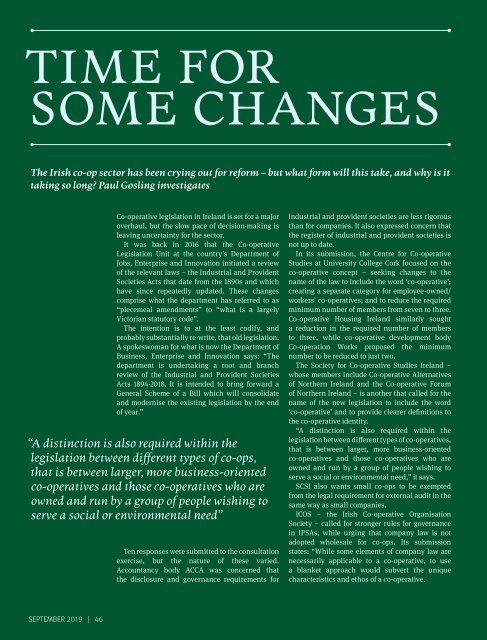Co-op News September 2019: Agriculture
How are co-ops working agriculture?
How are co-ops working agriculture?
Create successful ePaper yourself
Turn your PDF publications into a flip-book with our unique Google optimized e-Paper software.
TIME FOR<br />
SOME CHANGES<br />
The Irish co-<strong>op</strong> sector has been crying out for reform – but what form will this take, and why is it<br />
taking so long? Paul Gosling investigates<br />
<strong>Co</strong>-<strong>op</strong>erative legislation in Ireland is set for a major<br />
overhaul, but the slow pace of decision-making is<br />
leaving uncertainty for the sector.<br />
It was back in 2016 that the <strong>Co</strong>-<strong>op</strong>erative<br />
Legislation Unit at the country’s Department of<br />
Jobs, Enterprise and Innovation initiated a review<br />
of the relevant laws – the Industrial and Provident<br />
Societies Acts that date from the 1890s and which<br />
have since repeatedly updated. These changes<br />
comprise what the department has referred to as<br />
“piecemeal amendments” to “what is a largely<br />
Victorian statutory code”.<br />
The intention is to at the least codify, and<br />
probably substantially re-write, that old legislation.<br />
A spokeswoman for what is now the Department of<br />
Business, Enterprise and Innovation says: “The<br />
department is undertaking a root and branch<br />
review of the Industrial and Provident Societies<br />
Acts 1894-2018. It is intended to bring forward a<br />
General Scheme of a Bill which will consolidate<br />
and modernise the existing legislation by the end<br />
of year.”<br />
“A distinction is also required within the<br />
legislation between different types of co-<strong>op</strong>s,<br />
that is between larger, more business-oriented<br />
co-<strong>op</strong>eratives and those co-<strong>op</strong>eratives who are<br />
owned and run by a group of pe<strong>op</strong>le wishing to<br />
serve a social or environmental need”<br />
Ten responses were submitted to the consultation<br />
exercise, but the nature of these varied.<br />
Accountancy body ACCA was concerned that<br />
the disclosure and governance requirements for<br />
industrial and provident societies are less rigorous<br />
than for companies. It also expressed concern that<br />
the register of industrial and provident societies is<br />
not up to date.<br />
In its submission, the Centre for <strong>Co</strong>-<strong>op</strong>erative<br />
Studies at University <strong>Co</strong>llege <strong>Co</strong>rk focused on the<br />
co-<strong>op</strong>erative concept – seeking changes to the<br />
name of the law to include the word ‘co-<strong>op</strong>erative’;<br />
creating a separate category for employee-owned/<br />
workers’ co-<strong>op</strong>eratives; and to reduce the required<br />
minimum number of members from seven to three.<br />
<strong>Co</strong>-<strong>op</strong>erative Housing Ireland similarly sought<br />
a reduction in the required number of members<br />
to three, while co-<strong>op</strong>erative devel<strong>op</strong>ment body<br />
<strong>Co</strong>-<strong>op</strong>eration Works pr<strong>op</strong>osed the minimum<br />
number to be reduced to just two.<br />
The Society for <strong>Co</strong>-<strong>op</strong>erative Studies Ireland –<br />
whose members include <strong>Co</strong>-<strong>op</strong>erative Alternatives<br />
of Northern Ireland and the <strong>Co</strong>-<strong>op</strong>erative Forum<br />
of Northern Ireland – is another that called for the<br />
name of the new legislation to include the word<br />
‘co-<strong>op</strong>erative’ and to provide clearer definitions to<br />
the co-<strong>op</strong>erative identity.<br />
“A distinction is also required within the<br />
legislation between different types of co-<strong>op</strong>eratives,<br />
that is between larger, more business-oriented<br />
co-<strong>op</strong>eratives and those co-<strong>op</strong>eratives who are<br />
owned and run by a group of pe<strong>op</strong>le wishing to<br />
serve a social or environmental need,” it says.<br />
SCSI also wants small co-<strong>op</strong>s to be exempted<br />
from the legal requirement for external audit in the<br />
same way as small companies.<br />
ICOS – the Irish <strong>Co</strong>-<strong>op</strong>erative Organisation<br />
Society – called for stronger rules for governance<br />
in IPSAs, while urging that company law is not<br />
ad<strong>op</strong>ted wholesale for co-<strong>op</strong>s. Its submission<br />
states: “While some elements of company law are<br />
necessarily applicable to a co-<strong>op</strong>erative, to use<br />
a blanket approach would subvert the unique<br />
characteristics and ethos of a co-<strong>op</strong>erative.<br />
SEPTEMBER <strong>2019</strong> | 46


















